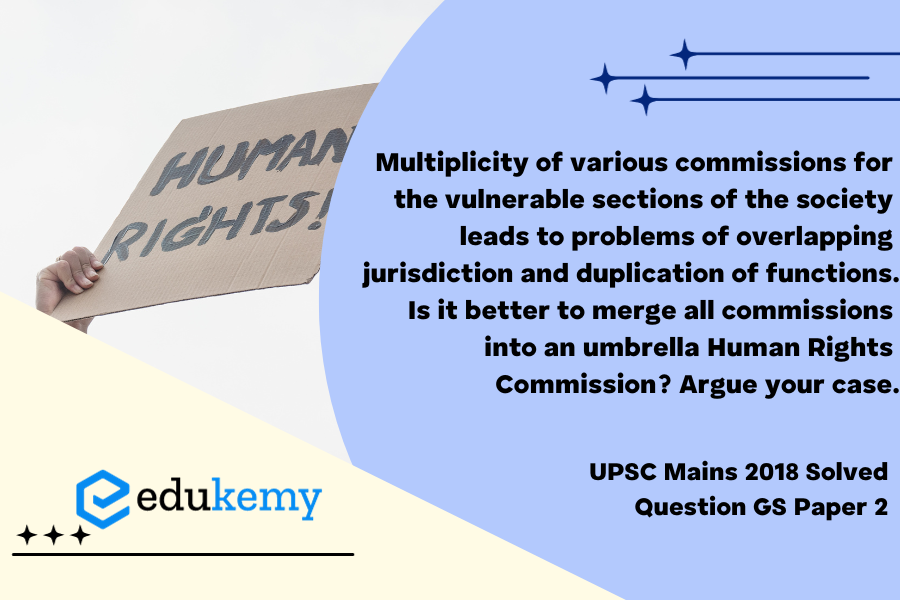The multiplicity of commissions aimed at addressing the needs of vulnerable sections in society raises significant concerns regarding overlapping jurisdiction and functional duplications. Currently, various commissions operate independently, each focusing on a specific aspect of human rights for different marginalized groups. However, the fragmented nature of these commissions often results in inefficiencies, redundancies, and the dilution of their overall impact. In order to streamline and enhance the effectiveness of human rights protection, the proposition of merging all these commissions under a single umbrella Human Rights Commission warrants careful consideration.
Consolidating the existing commissions into a unified entity would provide several advantages. First and foremost, it would eliminate the problem of overlapping jurisdiction, reducing confusion and ensuring a more coherent approach to addressing human rights violations across diverse groups. The consolidation would also result in a more efficient allocation of resources, avoiding the duplication of functions and allowing for a more focused and impactful utilization of funds and manpower. Additionally, a centralized Human Rights Commission could foster a comprehensive understanding of the interconnected issues faced by different vulnerable sections, facilitating a more holistic and integrated approach to policy formulation and implementation.
Tag: Welfare schemes for vulnerable sections of the population by the Centre and States and the performance of these schemes; mechanisms, laws, institutions, and Bodies constituted for the protection and betterment of these vulnerable sections.
Contents
Decoding the Question:
- In the Introduction, try to start your answer by defining the vulnerable section.
- In Body,
- Discuss the arguments in favor of integration under the Human Rights Commission.
- Discuss the arguments against integration under the Human Rights Commission.
- In Conclusion, try to suggest a way forward.
Answer:
Vulnerable sections like women, children, SC/STs, minorities, OBCs, and differently-abled are facing multiple socio-economic disadvantages in terms of health, education, mobility, economic opportunity, etc., in India. To redress it, the constitution or the legislation has provided for National Commissions for SCs and STs, Minorities, Women, and Children.
Issues with the Multiplicity of Commissions:
- Overlapping jurisdictions and duplication of efforts in dealing with complaints, and addressing grievances.
- Data duplications lead to narrow implementation and this negatively impacts the intended outcomes.
- Low financial independence and politicization of commissions, absence of checks and balances, etc.

Arguments in Favour of Integration under the Human Rights Commission:
- Resources will be used more efficiently as there will be no use of overlapping functions.
- There will be less contradiction in the judgments as in the case of different commissions.
- It will promote the holistic development of all vulnerable sections secure, dignified living conditions, and protection of human rights.
- It will remove the municipality and data duplication and will help in more sector-specific policy formulation keeping in mind the different vulnerabilities faced by them.
- The umbrella commission will be more fiscal and policy prudent and have fiscal independence and power to enforce legal provisions, which will strengthen its mandate.
Arguments Against Integration under the Human Rights Commission:
- It will overburden the Human Rights Commission.
- Too much centralization might be a hindrance in the way of community-specific problems.
- It can hamper expert analysis or inputs concerning different communities.
The establishment of an umbrella commission will be more fiscal and policy prudent. Having fiscal independence and power to enforce legal provisions will strengthen its mandate. Technology can be employed to promote more coordination among different sections to promote analysis and policy formulation and implementation. The Human Rights Commission (unified)needs to be given more teeth in terms of independent powers, functions and finance, to enforce its mandate and realize the socio- economic development of the vulnerable sections of society.
In case you still have your doubts, contact us on 9811333901.
For UPSC Prelims Resources, Click here
For Daily Updates and Study Material:
Join our Telegram Channel – Edukemy for IAS
- 1. Learn through Videos – here
- 2. Be Exam Ready by Practicing Daily MCQs – here
- 3. Daily Newsletter – Get all your Current Affairs Covered – here
- 4. Mains Answer Writing Practice – here


